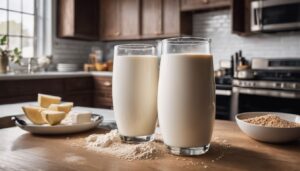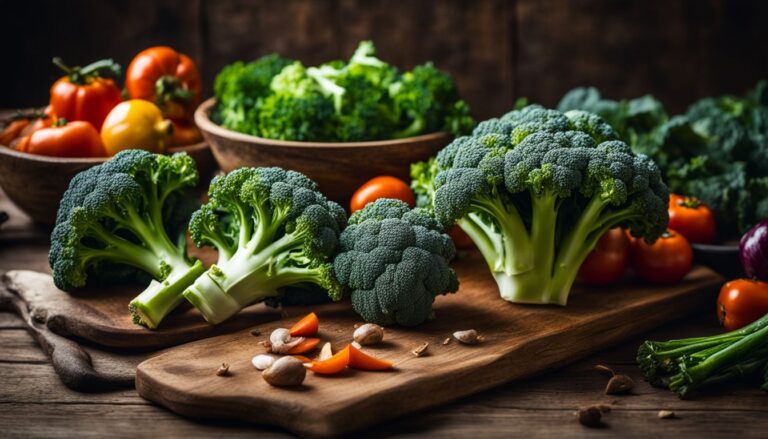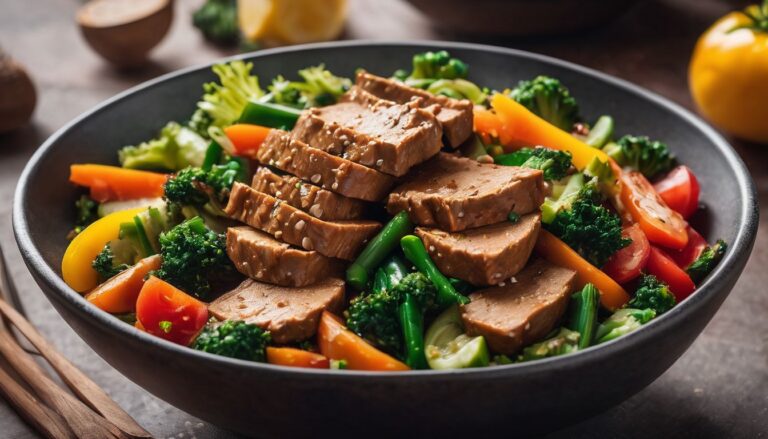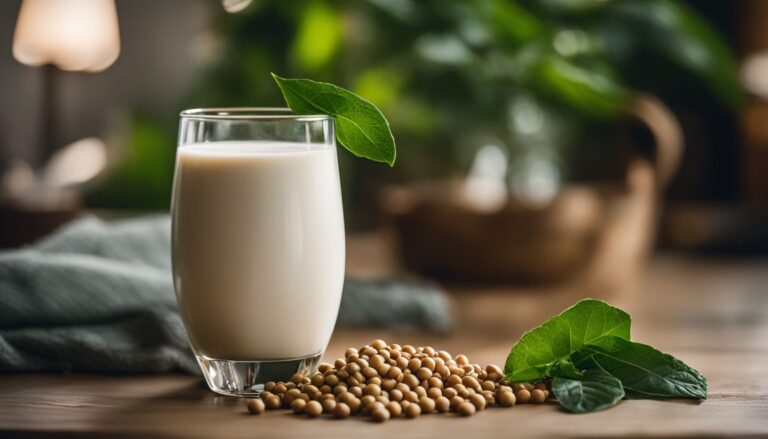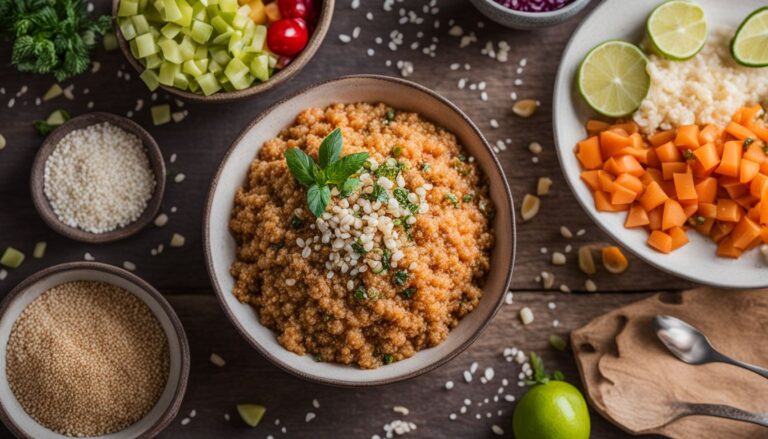Is Turkey Bacon A Good Source Of Protein? Find Out The Truth Here!
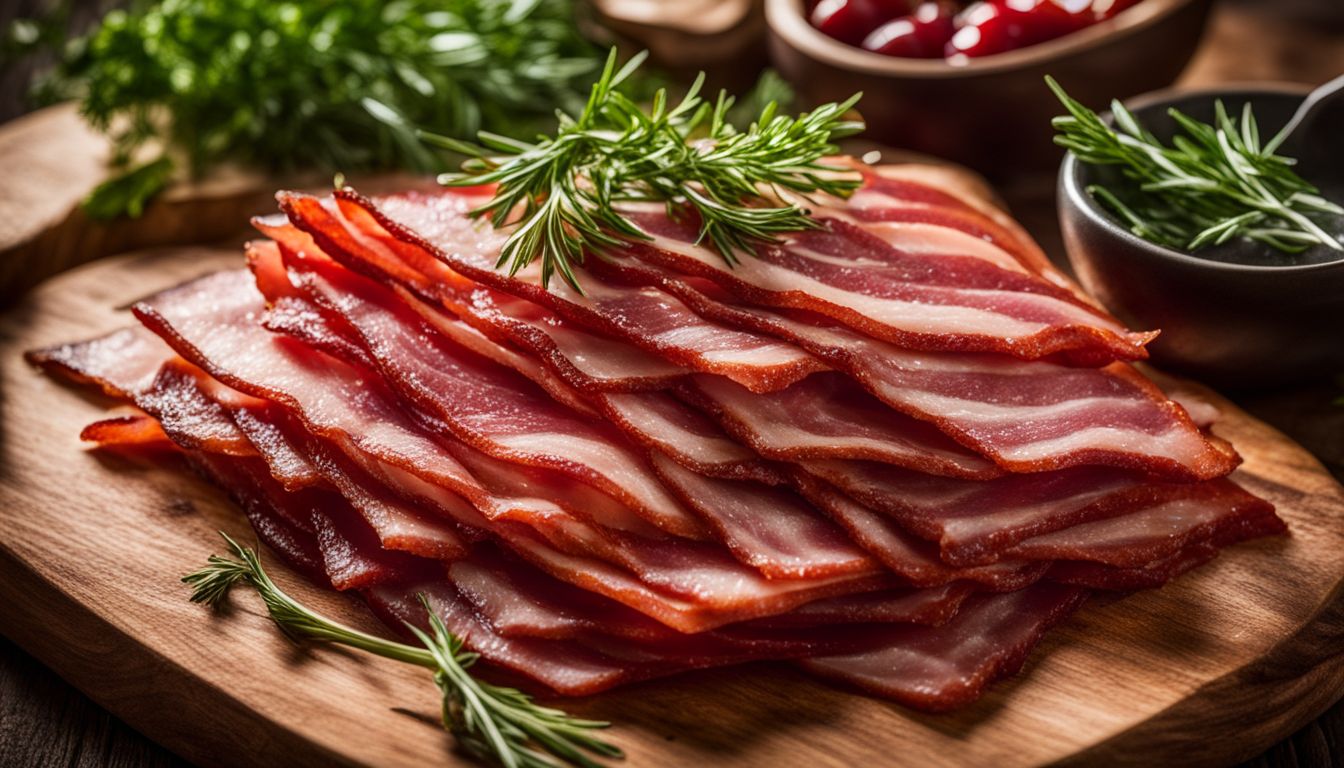
When it comes to protein sources, there’s a lot of buzz about turkey bacon as a healthier alternative to traditional pork bacon. As someone deeply immersed in the nutrition and wellness field for years, I’ve seen firsthand how dietary choices impact our health and fitness goals.
Turkey bacon has become an increasingly popular option for those striving to maintain a balanced diet without sacrificing the smoky flavor that classic breakfast meat provides.
Notably, turkey bacon boasts approximately 4.8g of protein per serving with fewer calories and less fat than its pork counterpart. This stat alone makes it alluring for anyone tracking macronutrient intake or looking for ways to slim down their morning meal routine without giving up on taste.
Keep reading to uncover more about this leaner protein choice—it may surprise you how beneficial turkey bacon can be when enjoyed as part of a varied diet. Discover the potential within these crispy strips!
Key Takeaways
- Turkey bacon is a lower-calorie and lower-fat alternative to traditional pork bacon, making it suitable for weight management and heart health.
- While turkey bacon contains less protein than pork bacon, its lean protein content supports muscle building and post-workout recovery, making it beneficial for fitness enthusiasts.
- Consumers should be mindful of potential drawbacks such as higher sodium levels, preservatives, and processing methods when considering turkey bacon as a protein source.
Nutrition and Calories in Turkey Bacon
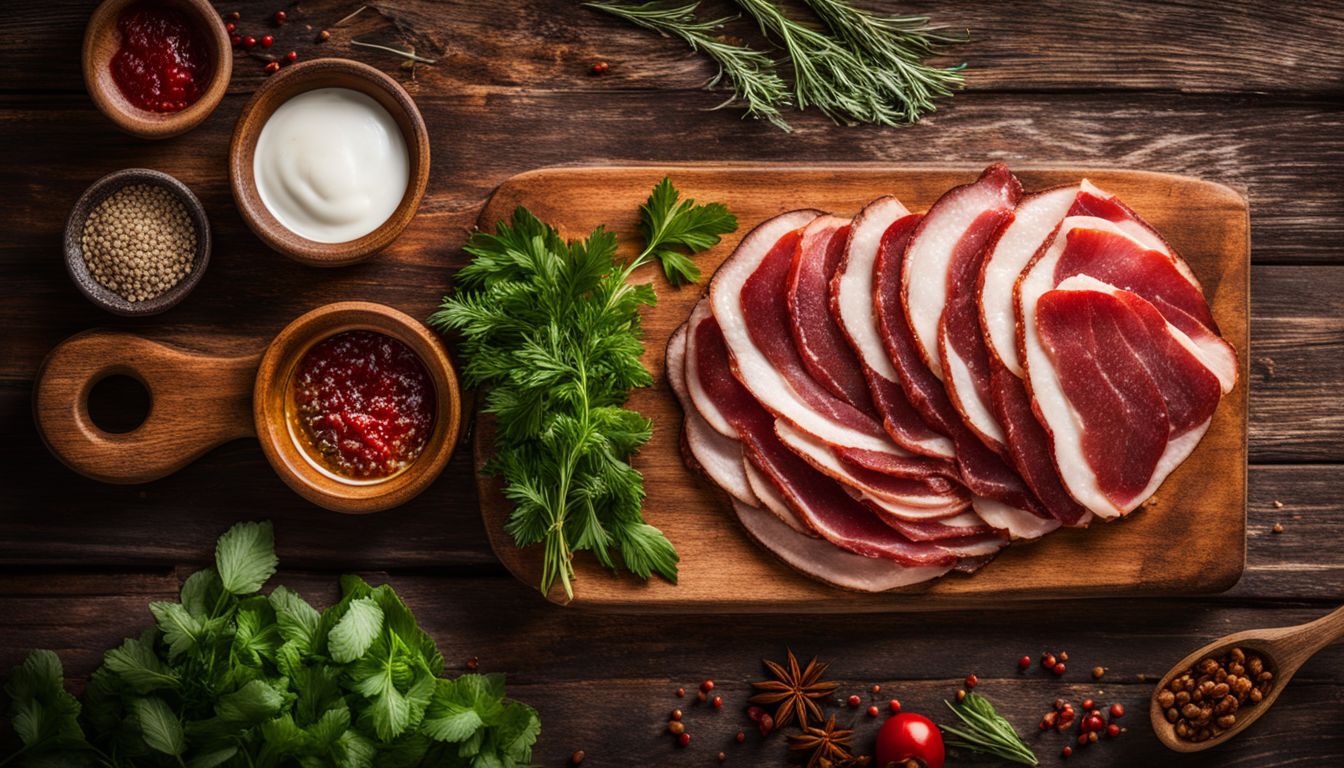
Turkey bacon is lower in calories and fat compared to traditional pork bacon, making it a popular choice for those seeking a leaner protein source. However, it contains less protein and tends to be higher in sodium content.
Lower in calories and fat than pork bacon

Choosing turkey bacon can be a savvy move for those looking to cut back on calories and fat in their diets. With only 60 calories and 4.2 grams of fat per serving, it’s a leaner alternative compared to pork bacon, which is known for its higher calorie and fat content.
Plus, you’ll get the added bonus of consuming just 1 gram of saturated fat with every serving of turkey bacon – far less than what you’d find in traditional pork slices.
Opting for this poultry product doesn’t mean sacrificing taste or texture but does provide a noteworthy benefit for heart health due to the lower levels of unhealthy fats. Is turkey bacon a good source of protein? Absolutely, as it offers essential nutrients that are beneficial when trying to maintain or improve overall well-being while indulging in that satisfying savory flavor we all love at breakfast time or as an addition to meals throughout the day.
Next up: how does the protein content in turkey bacon stack up against pork varieties?.
Less protein than pork bacon

While turkey bacon takes the lead in being lower in calories and fat, it doesn’t quite match up to pork bacon when it comes to protein content. Each serving of turkey bacon offers approximately 4.8 grams of protein – that’s less than half of the protein you’d get from a similar amount of pork bacon, which can provide around 20 grams per serving.
This might raise questions for those considering is turkey bacon a good source of protein?.
Even though it falls short on the protein scale compared to its pork counterpart, turkey bacon still stands as a respectable source of this essential nutrient. It’s important for individuals looking at leaner options or those who prefer poultry products over red meat to recognize that is turkey bacon a source of protein? Yes, but if your diet requires higher levels of protein, you may need to supplement with other high-protein foods or consider additional servings.
Turkey bacon fits into dietary patterns where moderation is key and balances out as part of an overall healthy eating plan rather than being relied upon as the primary source for one’s daily protein intake.
For active individuals weighing their options between various proteins could find that while is turkey bacon good source of protein for everyday needs, they might need more substantial sources post-workout or during muscle-building phases.
In summary, although is turkey bacon considered slightly less impressive as a direct swap based on just its pure nutritional value in terms of sheer numbers alone – especially regarding its lower values concerning the mighty macronutrient known as ‘protein’ – it remains beneficial within certain contexts and dietary preferences nonetheless.
Turkey Bacon does stand validly firm as something beyond dismissible; indeed not least because it serves well within a broader context encompassing elements such rigorously rationalized health implications along practical sensibilities surrounding taste too!
High in sodium

Turkey bacon may have less protein than its pork counterpart, but another nutritional aspect to consider is its sodium content. Each serving of turkey bacon packs 328mg of sodium—important for those monitoring their salt intake.
Consuming high amounts of sodium can lead to increased blood pressure and other heart-related issues, so moderation is key for anyone trying to maintain a healthy diet.
Opting for turkey bacon could be a smart move if you’re looking for a leaner protein source, but it’s essential to keep an eye on your overall consumption of salty foods. Turkey bacon’s high sodium level means that while it offers benefits as a lower-fat alternative, incorporating it into your meals requires thoughtful consideration in the context of your entire dietary pattern.
Benefits of Turkey Bacon as a Protein Source
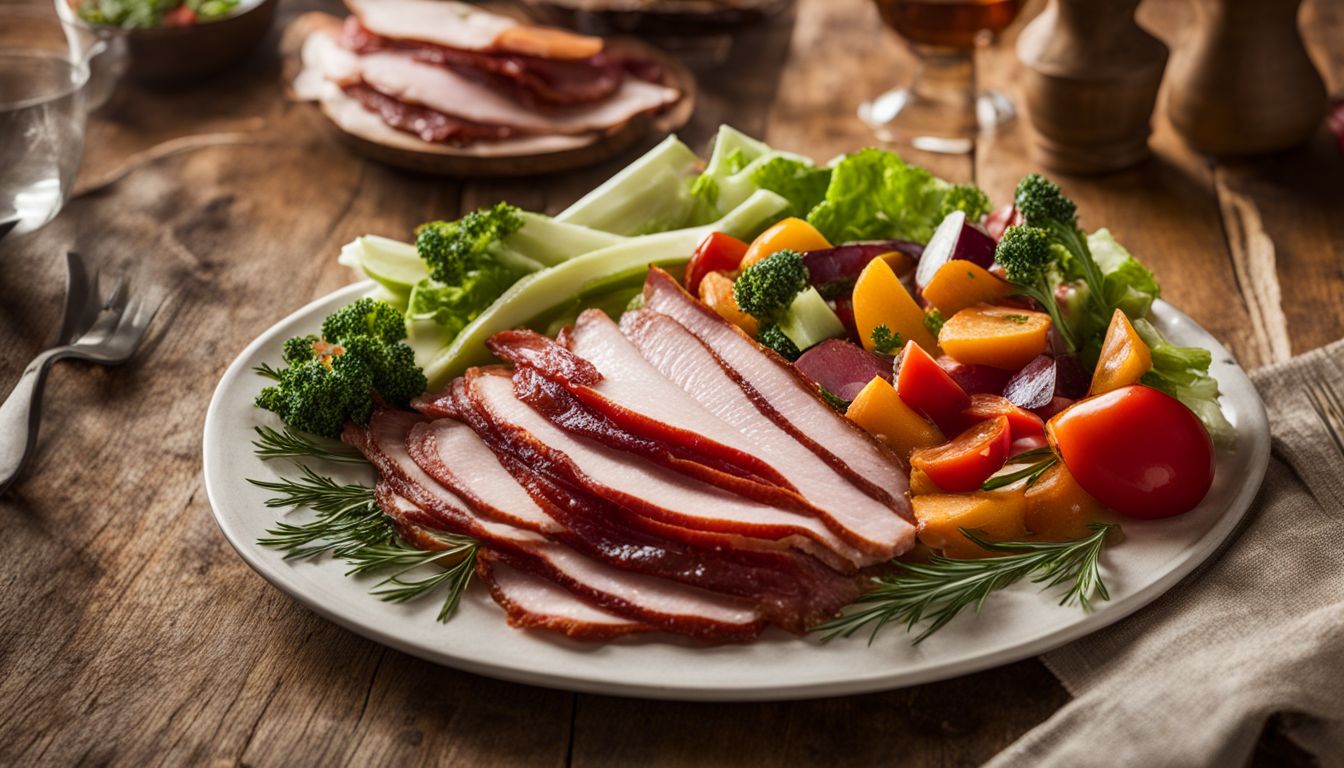
Turkey bacon is a good option for those who don’t eat pork, as it is lower in cholesterol and saturated fat compared to traditional bacon. It also provides easily digestible protein, making it a suitable choice for individuals looking to increase their protein intake.
Good option for those who don’t eat pork

Turkey bacon serves as a good protein source for individuals avoiding pork due to dietary or cultural reasons. With 4.8g of protein per serving, it offers a lean and nutritious alternative to pork-based products.
Additionally, its lower cholesterol and saturated fat content make it an attractive option for those seeking a healthier breakfast meat without compromising on taste.
Furthermore, the high protein content in turkey bacon can support muscle building and recovery after workouts, making it suitable for fitness enthusiasts or athletes looking to maintain a balanced diet.
Its reduced fat and calorie content also align with weight management goals while providing essential nutrients for overall health and wellness.
Lower in cholesterol and saturated fat

Turkey bacon is an attractive protein source due to its lower cholesterol and saturated fat content compared to pork bacon. It provides a healthier alternative for individuals concerned about their heart health and overall well-being.
With only 1g of saturated fat per serving, turkey bacon offers a leaner option without compromising on flavor or protein content.
Compared to traditional pork bacon, turkey bacon has notably lower levels of cholesterol and saturated fats, making it a wise choice for those aiming to reduce their intake of these unhealthy components in their diet.
Easily digestible

Turkey bacon is a highly digestible protein source, making it an excellent option for individuals with sensitive stomachs or digestive issues. With lower fat content and fewer calories than traditional pork bacon, turkey bacon can be easier on the digestive system while still providing a healthy dose of lean protein.
This makes it a suitable choice for those seeking a lighter alternative without sacrificing essential nutrients.
Considering its ease of digestion and nutritional benefits, many individuals opt for turkey bacon as part of their balanced diet to support their overall health and fitness goals. Whether you’re looking to manage weight or enhance muscle recovery after intense workouts, the digestibility of turkey bacon can play a significant role in your dietary considerations.
Downsides of Turkey Bacon

May contain harmful preservatives and higher in carbohydrates than pork bacon. But is it still a good source of protein? Keep reading to find out!
May contain harmful preservatives
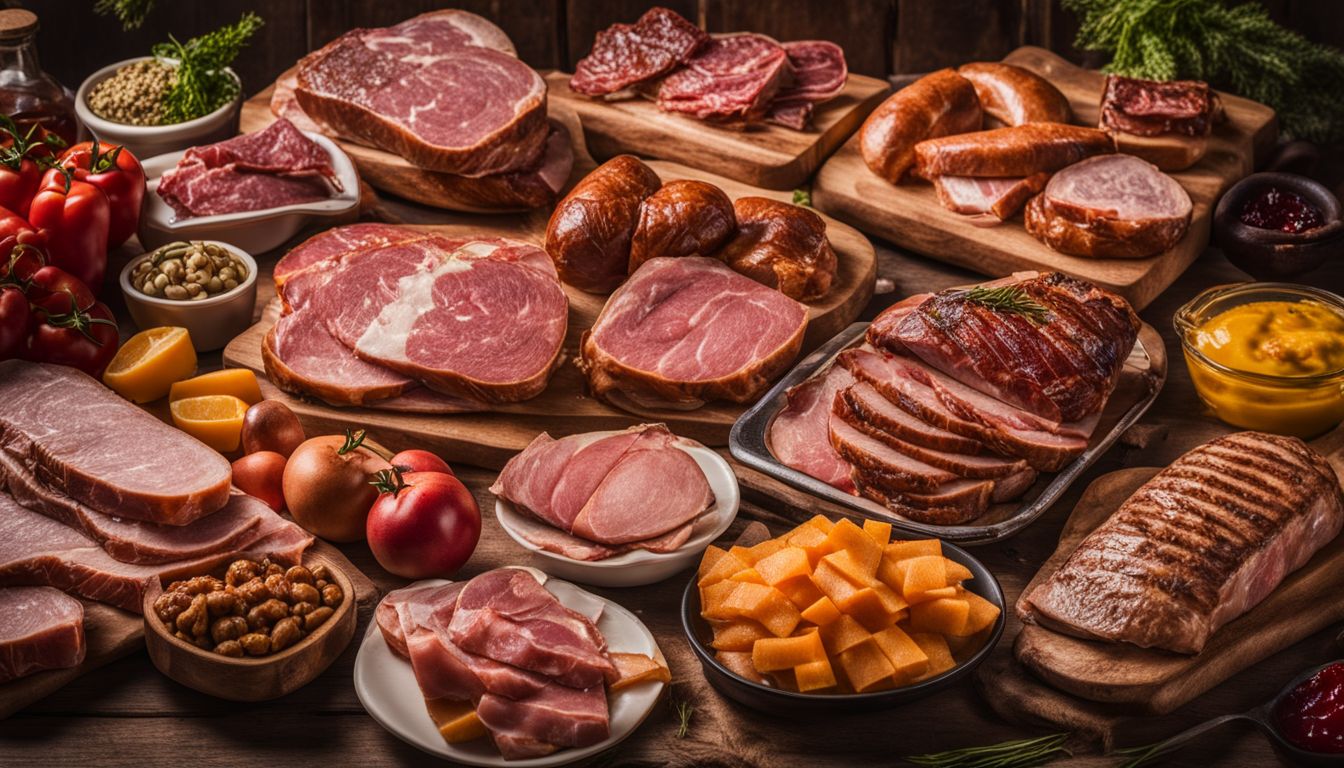
Turkey bacon may contain harmful preservatives, which can have adverse effects on health with prolonged consumption. The preservatives used in processed meats like turkey bacon may include additives such as sodium nitrate and sodium nitrite, which are linked to increased health risks.
These chemicals could be associated with a higher risk of certain types of cancer when consumed regularly over time. It’s important for consumers to be aware of the potential presence of these harmful additives and consider alternative options or limited consumption.
Considering the potential impact of preservatives on health, it’s essential for individuals to make informed choices about their protein sources and prioritize options that are minimally processed and free from potentially harmful substances.
Higher in carbohydrates than pork bacon
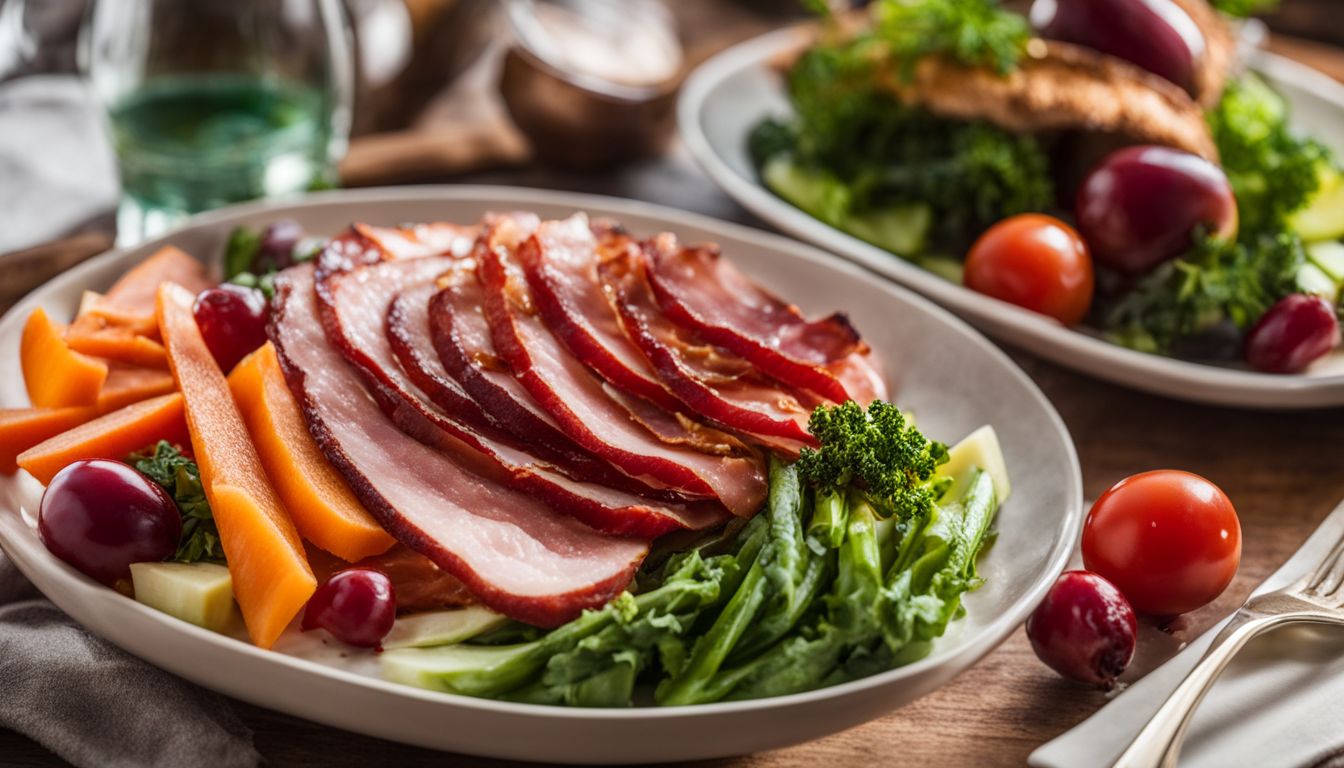
Turkey bacon contains more carbohydrates than pork bacon, with about 0.7g of carbs per serving. This higher carbohydrate content should be considered for those monitoring their carb intake or following specific dietary plans.
While turkey bacon is a healthier alternative to pork bacon in terms of fat content, individuals aiming to limit their carbohydrate consumption may want to be mindful of the slightly elevated carb levels in turkey bacon compared to its pork counterpart.
Processed meat product

Turkey bacon is a processed meat product that undergoes curing, smoking, and other preservation methods. It often contains additives such as nitrates and nitrites to enhance flavor, texture, and shelf life.
These additives have been linked to potential health risks when consumed in excess, including an increased risk of certain cancers. Additionally, the high sodium content in processed turkey bacon can contribute to elevated blood pressure and cardiovascular issues if not consumed in moderation.
Moreover, the processing of turkey bacon may lead to the formation of harmful compounds such as polycyclic aromatic hydrocarbons (PAHs) and heterocyclic amines (HCAs) during cooking at high temperatures.
How Turkey Bacon Can Benefit Sports Training and Workouts

Turkey bacon can be a beneficial protein source for sports training and workouts due to its high protein content, which is essential for muscle building and recovery. Additionally, its lower calorie and fat content can support weight management and overall fitness goals.
High in protein for muscle building and recovery

Turkey bacon is a protein-rich option, providing 4.8g of protein per serving. This lean source of protein is beneficial for muscle building and recovery, making it suitable for individuals engaged in sports training or regular workouts.
Its high protein content supports muscle repair and growth after exercise, aiding in post-workout recovery. Additionally, the low-fat nature of turkey bacon makes it an excellent choice for those aiming to maintain overall health and fitness while meeting their protein needs without excessive calorie intake.
Lower in calories for weight management
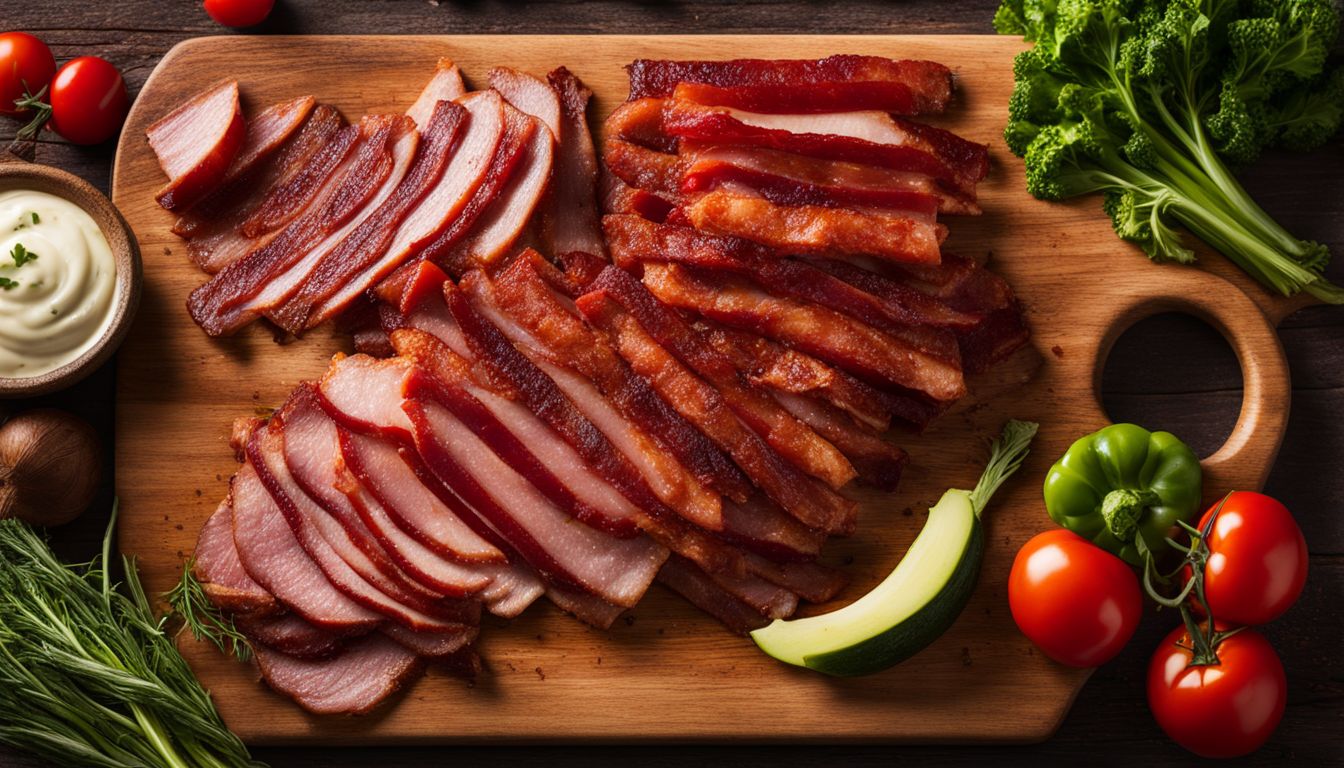
Turkey bacon is a favorable option for individuals aiming to manage their weight due to its lower calorie content. With approximately 60 calories per serving, it offers a lighter alternative to pork bacon, making it suitable for those looking to reduce their overall caloric intake.
This can be particularly beneficial for individuals focusing on weight management or those seeking a leaner protein source. Additionally, the reduced fat content in turkey bacon aligns with health and fitness goals, promoting balanced nutrition without compromising on flavor.
The lower calorie count of turkey bacon makes it an attractive choice for those seeking healthier breakfast meat options or incorporating it into various meals without significantly impacting daily caloric consumption.
Lower in fat for overall health and fitness

Turkey bacon provides a leaner alternative to pork bacon, making it a suitable choice for individuals seeking to manage their weight and improve overall health. With only 4.2g of fat and 1g of saturated fat per serving, turkey bacon can support lower-fat diets and reduce the risk of heart disease associated with high levels of saturated fats.
This leaner profile makes turkey bacon an attractive option for those looking to maintain fitness while enjoying a flavorful protein source.
For individuals aiming to achieve better health through reduced intake of red meat and increased consumption of lean proteins, turkey bacon offers a beneficial balance between flavor and nutritional value.
Conclusion

In conclusion, Turkey bacon can be a nutritious protein source for those seeking a healthier alternative to pork bacon. With lower calories and fat than traditional bacon, it offers practical benefits for weight management and overall health.
Despite being lower in protein content compared to pork bacon, its lean protein makes it an efficient choice for muscle building and recovery. Making the switch to turkey bacon can have a significant impact on reducing saturated fat intake and improving one’s dietary choices.
For further insights into healthy protein sources, consider exploring other poultry products that offer similar nutritional advantages.
FAQs
1. What nutrients does turkey bacon provide?
Turkey bacon is a good source of protein and provides essential nutrients such as B vitamins, iron, and zinc.
2. How does turkey bacon compare to pork bacon in terms of nutrition?
Compared to pork bacon, turkey bacon typically has lower fat and calorie content while still providing a significant amount of protein.
3. Is turkey bacon a healthier alternative to pork bacon?
Yes, for individuals looking to reduce their intake of saturated fats and calories, opting for turkey bacon can be a healthier choice.
4. Can I incorporate turkey bacon into a balanced diet?
Yes, incorporating turkey bacon into your diet in moderation along with other nutrient-rich foods can contribute to a balanced and varied eating plan.
5. Are there any downsides or considerations when consuming turkey bacon as a protein source?
While it can be lower in fat than pork bacon, some varieties of turkey bacon may still contain additives or preservatives that should be considered when including it in your diet.
Sources referenced in this article
- https://www.eatingwell.com/article/7935512/is-turkey-bacon-healthy/
- https://health.clevelandclinic.org/turkey-bacon-how-healthy-is-it-really/
- https://www.health.com/nutrition/is-turkey-bacon-healthy
- https://www.verywellfit.com/turkey-bacon-nutrition-facts-4684391
- https://www.webmd.com/diet/health-benefits-bacon
- https://godshalls.com/healthy-habits/5-reasons-to-fall-in-love-with-turkey-bacon/
- https://draxe.com/nutrition/is-turkey-bacon-healthy/

Author
Years ago, the spark of my life’s passion ignited in my mind the moment I stepped into the local gym for the first time. The inaugural bead of perspiration, the initial endeavor, the very first surge of endorphins, and a sense of pride that washed over me post-workout marked the beginning of my deep-seated interest in strength sports, fitness, and sports nutrition. This very curiosity blossomed rapidly into a profound fascination, propelling me to earn a Master’s degree in Physical Education from the Academy of Physical Education in Krakow, followed by a Sports Manager diploma from the Jagiellonian University. My journey of growth led me to gain more specialized qualifications, such as being a certified personal trainer with a focus on sports dietetics, a lifeguard, and an instructor for wellness and corrective gymnastics. Theoretical knowledge paired seamlessly with practical experience, reinforcing my belief that the transformation of individuals under my guidance was also a reflection of my personal growth. This belief holds true even today. Each day, I strive to push the boundaries and explore new realms. These realms gently elevate me to greater heights. The unique combination of passion for my field and the continuous quest for growth fuels my drive to break new ground.

